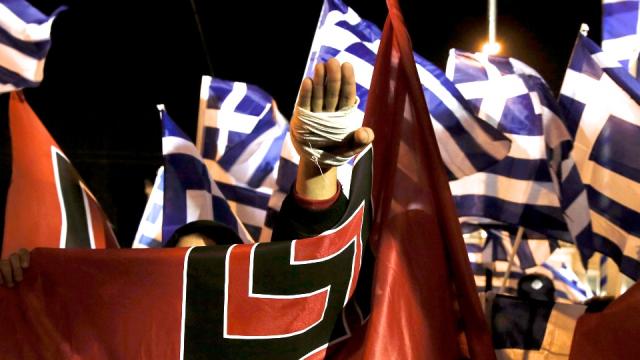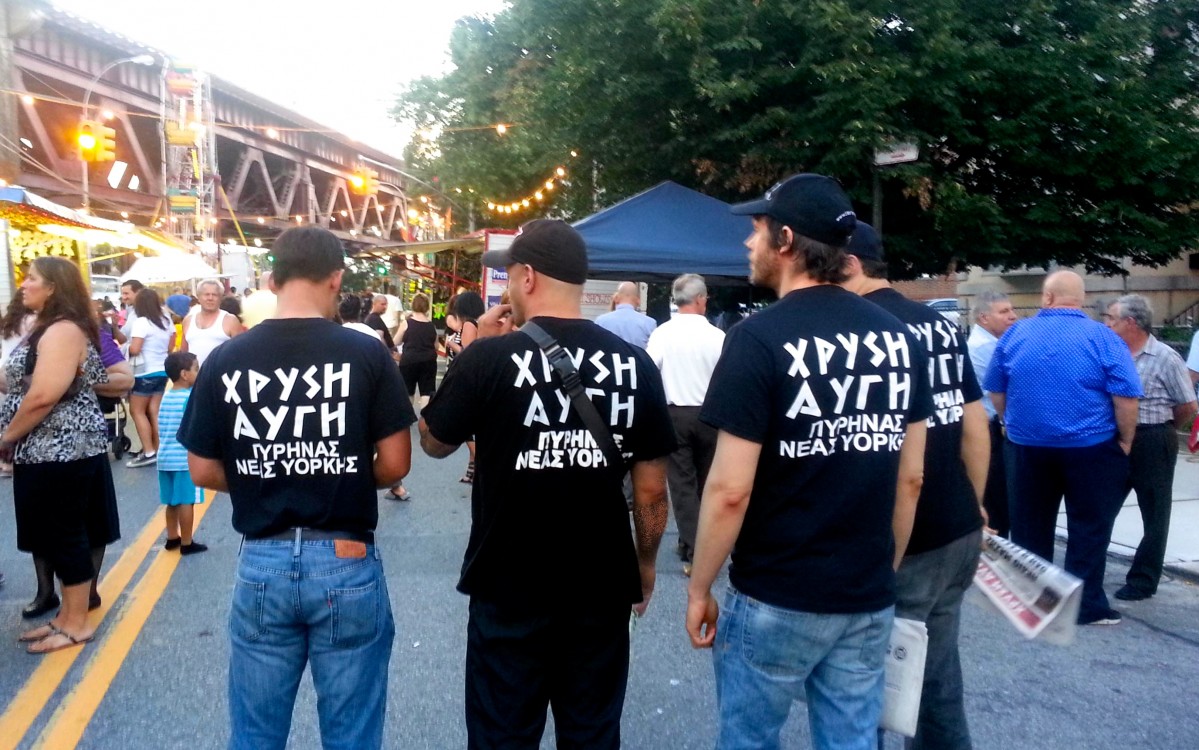
One of the biggest fallouts from the economic crisis of 2008 was the decimation of the Greek economy. The multinational banks that precipitated the crisis got bailed out and many prominent media outlets, especially in Northern Europe, put forward arguments that blamed the Greek people for the catastrophe that had befallen them.
Many of those who believe that the austerity policies of the Troika – the European Central Bank, the European Commission and the IMF – have been a disaster for the country were given some hope by the recent election of Syriza, a party demanding further negotiations to deal with Greece’s debt and keep it in the euro zone. While Syriza’s win has been seen as a victory for the “radical left” by the financial press from New York to Frankfurt, another part of the story has for the most part been ignored.
The scandal ridden Chrysi Avgi (Golden Dawn) Party, which has openly advocated attacks on immigrants and other vulnerable members of Greek society, rose to become the third largest party in the Greek parliament – despite the fact that pre-election polls showed their support had dropped from its high of 7% in 2012.
The founder of Golden Dawn, Nikos Michaloliakos, claimed he formed the group after meeting with members of “The Junta” while doing a stint in prison. The Junta’s coup, which imposed military rule on Greece from 1967 to 1974, resulted in scores of deaths, an epidemic of torture and a crisis on the island nation of Cyprus, which is divided between Greeks and Turks. These are the strong men the party puts forward as its heroes.
Golden Dawn on Trial
On Sept. 18, 2013, Pavlos Fyssas, a.k.a. Killah P, was watching a soccer game in a cafe in the port city of Piraeus, just seven miles from Athens. Fyssas, 34, was becoming famous as a rapper and anti-racism advocate, so it didn’t bode well that he was sitting in the same room as another group of men who claimed to be members of Golden Dawn.
A few days earlier, around 30 people putting up posters for Greece’s Communist Party were attacked by at least 50 others, many of whom wore black Golden Dawn T-shirts. The assailants were wielding “crowbars and poles to which they had attached nails, screws and other sharp instruments.” The attack resulted in multiple injuries. Bystanders and those assaulted claimed that police stood by and did nothing.
It was shortly after midnight when Fyssas and his girlfriend, along with another couple, left the cafe. Eyewitness accounts of what happened next sent a chill down the collective spine of Greek society, ultimately leading to more than 70 arrests, including 13 of the 17 Golden Dawn members serving in the current parliament. They are charged with, among other things, arson, stock-piling weapons and, most seriously, “operating a criminal enterprise” similar to a racketeering charge in the U.S.
According to multiple accounts, Fyssas was surrounded on the street before a car pulled up and a middle-aged man stepped out of it and stabbed him, twice in the heart and again in the stomach. In his last act, Fyssas pointed at the man who attacked him before being brought to hospital where he was soon pronounced dead.
Giorgos Roupakias, whom Golden Dawn has denied having any link to despite his party membership card being found in the trash outside his home, is reported to have told his arresting officer he was working with the group in the hope that police would afterwards let him go. He later confessed to the murder.
In Piraeus, Golden Dawn was working to create a company union in the shipyards in opposition to unions already in place, including the metal workers union of which Fyssas was a part. It's believed the union project was undertaken at the behest of local shipping magnates who wield considerable influence in Greek politics and had [donated 240,000 euros to the party](http://www.counterpunch.org/2015/03/24/greece-fascists-at the gate/).
Replacing the Social State with a Fascist State
One of the most interesting things about Golden Dawn, especially several years ago when its influence was at its peak, is how the party managed to take over various functions of the Greek state. Most alarming for anti-fascists was the party’s perceived connections to the police. There are multiple reports of people reporting incidents to authorities and being told to call representatives of Golden Dawn instead.
To win converts, Golden Dawn set up food drives and donated blood but reserved their charity for “pure” Greeks. This led to a measure of support among working and middle class people that would have been unlikely before austerity measures made such services necessary for many. The party has also expanded its reach into the Greek diaspora, raising money with chapters created or planned in Canada, the U.S. and Australia.
A blog for Golden Dawn New York asks supporters to purchase pre-paid Visa cards to help finance the party’s activities in Greece. The same blog claims that the party represents the ideals of Classical Greece, most specifically Sparta. What the party, and most fictionalized versions of ancient Sparta fail to note, is that those much vaunted warriors could only exist in a society based entirely on the slavery of an indigenous population, “the Helots.”
It's tempting to dismiss the rise – and now the possible fall – of Golden Dawn as the predictable result of a mix of devastating E.U. austerity measures and politically motivated soccer hooligans, as many mainstream commentators have done. In this telling, it is a peculiarly Greek story, isolated, with no implications for Europe as a whole.
Yet throughout the continent, from the Ukraine’s Azov Battalion and other neo-Nazi militias to France’s National Front, extreme nationalism is on the rise. While the large counter-protests aimed at groups like PEGIDA in Germany have shown that most Europeans still oppose the ideas of the extreme right, continued austerity, especially in Europe’s poorer countries, could leave those left behind looking for scapegoats. A situation that history teaches us never ends well.
3 WAYS TO SHOW YOUR SUPPORT
- Log in to post comments












